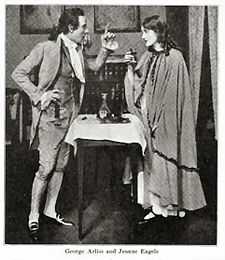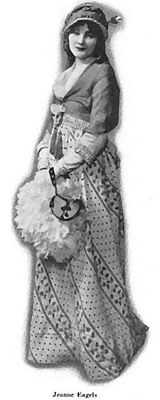Jeanne Eagels
| Jeanne Eagels | |
|---|---|
 | |
| Born |
Eugenia Eagles June 26, 1890 Kansas City, Missouri, U.S. |
| Died |
October 3, 1929 (aged 39) New York City, New York, U.S. |
Resting place | Calvary Cemetery, Kansas City, Missouri |
| Nationality | American |
| Occupation | Actress |
| Spouse(s) |
Morris Dubinsky (? - ?) Edward Harris Coy (1925-1928) |
Jeanne Eagels (June 26, 1890 – October 3, 1929) was an American actress on Broadway and in several motion pictures.[1] She was a former Ziegfeld Follies Girl who went on to greater fame on Broadway and in the emerging medium of sound films.
She was posthumously considered for the Academy Award for Best Actress for her 1929 role in The Letter after dying suddenly that year at the age of 39. That nomination was the first posthumous Oscar consideration for any actor, male or female.
Early life
Jeanne Eagels was born in Kansas City, Missouri, to Edward and Julia Sullivan Eagles (1865–1945) on June 26, 1890, of German and Irish descent. Her parents were married on April 26, 1886, in Platte City, Platte County, Missouri. Although many biographies state that her birth name was Amelia Jeanne Eagles, her actual birth name was Eugenia Eagles according to both the 1900 and 1910 United States Federal Censuses for Kansas City, Missouri. Her sister, Edna, also had a daughter named Eugenia. According to her obituary and census records, she was the second oldest child. Her siblings were Edna, George, Helen, Leo, and Paul.
Her father died on February 15, 1910, in Kansas City, leaving his 44-year-old widow with six children to raise. Eagels attended St. Joseph's Catholic School and Morris Public School. She quit school shortly after her First Communion to work as a cash girl in a department store.
Career
Eagels began her acting career in Kansas City, appearing in a variety of small venues at a very young age. She left Kansas City around the age of 15 and toured the Midwest with the Dubinsky Brothers' traveling theater show. At first, she was a dancer, but in time she went on to play the leading lady in several comedies and dramas put on by the Dubinskys. She married Morris Dubinsky, who frequently played villain roles.

Around 1911, she moved to New York City, working in chorus lines and eventually becoming a Ziegfeld Girl. Her hair was brown, but she bleached it when she went to New York. During this period, one of her acting coaches was Beverly Sitgreaves. Eagels was in the supporting cast of Mind The Paint Girl at the Lyceum Theatre in September 1912. Eagels played opposite George Arliss in three successive plays in 1916 and 1917.
In 1915, she appeared in her first motion picture. She also made three films for Thanhouser Film Corporation in 1916-17.
In 1918, she appeared in Daddies, a David Belasco production. She quit this show due to illness and subsequently travelled to Europe. She appeared in several other Broadway shows between 1919 and 1921.
In 1922, she made her first appearance as a star in the play Rain, by John Colton, based on a short story by W. Somerset Maugham. Eagels played her favorite role, that of Sadie Thompson, a free-wheeling and free-loving spirit who confronts a fire-and-brimstone preacher on a South Pacific island. She went on tour with Rain for two more seasons and returned to Broadway to give a farewell performance in 1926.
In 1925, Eagels married Edward Harris "Ted" Coy, a former Yale University football star turned stockbroker. They had no children and divorced in 1928.

In 1926, Eagels was offered the part of Roxie Hart in Maurine Dallas Watkins's play Chicago, but Eagels walked out of this role during rehearsals. She next appeared in the comedy Her Cardboard Lover (1927), in which she appeared on stage with Leslie Howard. She then went on tour with Her Cardboard Lover for several months. After missing some performances due to ptomaine poisoning, Eagels returned to the cast in July 1927 for an Empire Theater show.
After a season on Broadway, she took a break to make a movie. She appeared opposite John Gilbert in the MGM film Man, Woman and Sin (1927), directed by Monta Bell.
In 1928, after failing to appear for a performance in Milwaukee, Wisconsin, Eagels was banned by Actors Equity from appearing on stage for 18 months. The ban did not stop Eagels from working in film, and she made two "talkies" for Paramount Pictures, including The Letter and Jealousy (both released in 1929).
Death and legacy
Just before she was to return to the Broadway stage in a new play, Eagels died suddenly upon visiting a private hospital in New York City on October 3, 1929, at the age of 39. Medical examiners disagreed on the cause of death—there were three separate coroner's reports, all reaching different conclusions—but the available evidence pointed to the effects of alcohol, a tranquilizer, or heroin. After services in New York, Eagels received a second funeral service when her body was returned to Kansas City, where she was buried in Calvary Cemetery.
She was survived by her mother Julia Eagles and several brothers and sisters.
Eagels was posthumously nominated for the third annual Academy Award for Best Actress for her role in The Letter, but the Oscar went to Mary Pickford for the film Coquette.
In 1957, a mostly fictionalized film biography titled, Jeanne Eagels, was made by Columbia Pictures, starring Kim Novak as Eagels.
Filmography

- The House of Fear (1915)
- The World and the Woman (1916)
- The Fires of Youth (1917)
- Under False Colors (1917)
- The Cross Bearer (1918)
- The Madonna of the Slums (1919)
- Man, Woman and Sin (1927)
- The Letter (1929)
- Jealousy (1929)
References
- New York Times, This Week To See Rush Of New Plays, September 8, 1912, Page X4.
- Kansas City Star "Another Kansas City Girl 'Arrives' October 5, 1913 Page 15
- Kansas City Post "Jeanne Eagles passes up Wales to play 'Rain" before mother April 10, 1925 p. 29
- New York Times, Jeanne Eagels Playing Again, July 13, 1927, Page 20.
- New York Times, The Vacillating Vampire, December 5, 1927, Page 26.
- Great Stars of the American Stage," copyright 1952 by Daniel Blum, Page 80.
- 1900 United States Federal Census, Kansas City, Jackson County, Missouri, June 4, 1900, ED 111, p.5.
- 1910 United States Federal Census, Kansas City Ward 9, Jackson County, Missouri, Enumeration District 111.
- Kansas City, Missouri, Kansas City Star, Edward W. Eagles Mortuary Notice, February 15, 1910.
- Reno, Nevada, Reno Evening Gazette, "Eagels Burial Services Today", October 27, 1929, p. 3.
- Adams, Massachusetts, The North Adams Transcript, "Jeanne Eagels Dies Suddenly", October 4, 1929, p. 1.
- Missouri Marriage Records, 1805–2002, Ancestry.com.
- California Death Index, 1940–1997, Ancestry.com
Footnotes
External links
| Wikimedia Commons has media related to Jeanne Eagels. |
- Jeanne Eagels at the Internet Movie Database
- Jeanne Eagels at the Internet Broadway Database
- Jeanne Eagels at Find a Grave
- Jeanne Eagels photo taken in 1917 not published until 1974; NYP Library collection
- Biographical website